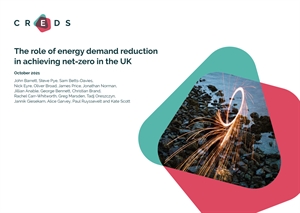UK won't achieve net zero without energy demand reduction - CREDS report
Wed 06 October 2021
View all news

A new study by the Centre for Research into Energy Demand Solutions (CREDS) looked at the role of energy demand reduction in achieving net zero in the UK. The study found that meeting carbon budgets aligned with net zero by 2050 without substantial reductions in energy demand is "extremely difficult and undesirable".
The work, bringing together 17 energy demand modelling experts from CREDS, is the most comprehensive assessment to date of the role of reducing energy demand to meet the UK’s net zero climate target.
The key findings of the report are:
- Without substantial reductions in energy demand, meeting climate targets becomes extremely expensive due to the substantial increases in the size of the energy system and the installation of expensive carbon dioxide removal (CDR) technologies. Energy demand reduction is a significant enabler of a cost effective, timely and de-risked net zero target.
- Meeting carbon budgets aligned with net zero by 2050 without substantial reductions in energy demand is extremely difficult and undesirable. Without reducing energy demand all greenhouse gas (GHG) emission reductions would need to be delivered through decarbonisation of energy supply and engineered CDR technologies.
- The UK could more than halve its energy demand by 2050, making a substantial contribution to global and UK climate goals. Existing policy instruments would only reduce energy demand by 5% by 2050.
- Without a stronger role for energy demand reduction, the electricity system needs to be four times the size that it is today. Substantial energy demand reduction will moderate the expansion of the electricity system to double its current size making system expansion more achievable.
- There are numerous co-benefits that could improve quality of life while reducing energy demand. People can still have access to local services, leisure and holiday activities, and diverse employment opportunities etc. Co-benefits to pursuing energy demand reduction include improved air quality, warmer homes, healthier diets and increased opportunities for exercise.
- Energy demand reductions are possible across all sectors. Reducing energy service demand is particularly useful in 'hard to mitigate' sectors such as steel production, aviation and agriculture. The response is different for each energy service and must include strategies to protect and enhance quality of life while reducing energy services as well as more traditional policy areas related to energy efficiency.
- Some energy demand reduction measures offer earlier mitigation opportunities and a greater reduction in cumulative emissions. This would allow the UK to increase its climate ambition further in the next decade, establishing a role as a key leader in addressing the climate crisis.
The researchers conclude that without energy demand reduction, the UK will not achieve the UK’s Sixth Carbon Budget target in 2035 of 78% below 1990 levels, or the 2050 net zero target.
Reducing energy demand to the extent, and at the speed, that is needed requires both an acceleration in energy efficiency improvement and shifts in the consumption patterns of products and services, travel and diets to avoid the consumption of energy services.
The study says that none of the Low Energy Demand (LED) scenarios modelled compromise peoples' quality of life. Instead, they seek to enhance it with numerous co-benefits associated with healthier diets, active living, clean air, safe communities, warm homes, rebalancing work and driving down inequality. They say that all this is possible while halving the UK’s energy demand.
CREDS Director, Professor Nick Eyre said: "This report adds to the evidence base being assembled by the Oxford-led CREDS research team on the importance of energy use in achieving net zero. We have already shown that improvements in energy efficiency have delivered more carbon emissions reduction than anything else, and that further massive efficiency improvements are possible globally. With this report we set out a detailed analysis of how the UK can halve its energy use by 2050."
For more information, please follow the associated links.
Related Links
< Back to news list